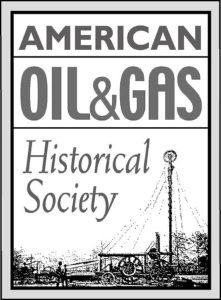Preserving the foundation of Oklahoma petroleum exploration and production history.
Looking for hand-drawn geologic strip-log records of structure features and detail about rocks, sands, clays, shales, and other formations? Carefully filed in rows of cabinets, a library of mid-continent well data benefits the Oklahoma petroleum industry. The Mid-Continent Geological Library collection preserves well data. It holds eons of geologic history.
Editor’s Update — The Mid-Continent Geological Library (MCGL), established in 1966, by 2020 was relocated from downtown Oklahoma City to nearby Edmond, where facilities preserve more than 211,000 proprietary, hand-written scout tickets dating from the early 1900s into the 1950s.
The move helped financially support expanded digitization and storage of documents, according to the the Oklahoma City Geological Society. Located at 3409 S. Broadway, No. 804, in Edmond, the facility offers researchers thousands of easily accessible geological histories; its growing digital archive is the premier repository for mid-continent well logs.
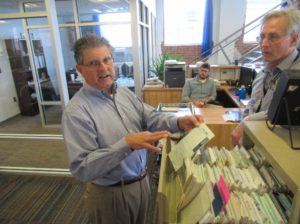
MCGL’s Mike Harris in 2017 noted well logs typically unfolded for many feet. Photos by Bruce Wells.
Recent History
Thanks to the Oklahoma City Geological Society (OCGS), which began the extensive collection in the 1960s, the geological library first moved from Oklahoma City’s First National Center to a site on 6th Street in January 2015.
The society also began the legal process of making the library independent, according to former MCGL CEO Mike Harris in a September 2017 interview. That summer, MCGL officially became a 501(c)(3) separate organization.
By 2020, the library had been moved to a larger location in Edmond after sale of the 6th Street location in Oklahoma City helped finance the digital transformation of library data.
OCGS members continue to support and give historic records to the library. The collection of well log histories has resulted from a long-standing arrangement with the state of Oklahoma.
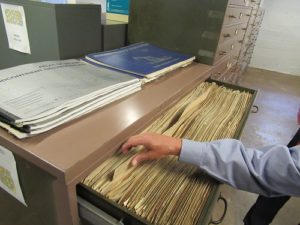
A MCGL drawer containing strip/sample logs. These are filed in section, township and range (congressional grid) order.
Well logs submitted by operators to the Oklahoma Corporation Commission for required public release are provided to MCGL on a biweekly basis. On behalf of the state, MCGL staff scans the newly released logs, which also are printed and filed in the library’s log files, where they are available to library members and other users. Lists of released logs are posted online after processing. CDs containing log images are returned to state officials.
Importantly, new well log data files are immediately uploaded to the MCGL digital library where subscribers are able to view and download them. “This is well before they can be accessed from commercial services or the state,” Harris explained. That is a benefit of library membership.
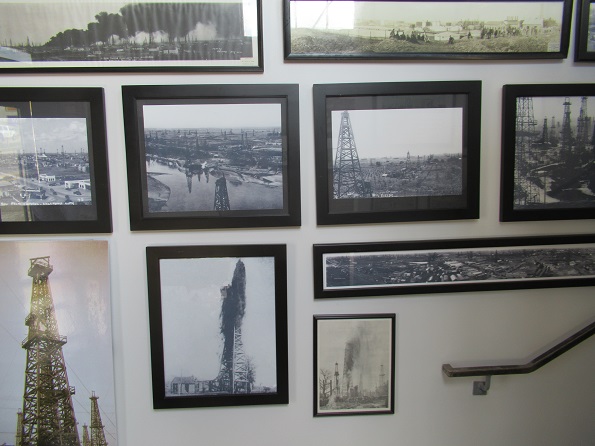
The MCGL collection has preserved images depicting Oklahoma petroleum history, which began a decade before statehood in 1907.
The well log library originated in 1966 when several OCGS geologists acquired a private collection. It now operates autonomously from the geological society, allowing more of the general public to explore the collection. “Anyone can be a member of the library,” noted Harris. “It is a public resource. As a not-for-profit, anyone who wants to pay the dues can have access to the facility’s information.”
Access to Geological Records
Accessibility is a key part of MCGL mission of collecting, preserving and archiving geological data. Online researchers must buy a subscription, which helps fund operations and on-going development the MCGL Digital Library. The influx of well data and other information is continuous, which adds value. Exploration companies frequently have their geologists join to gain early access.
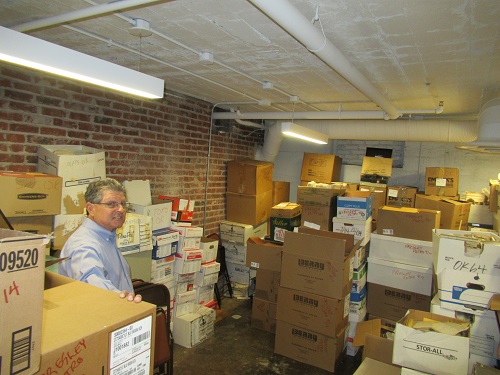
Today preserved in facilities in Edmond, Oklahoma, significant amounts of historical well data have been given to the library,” noted Mike Harris in 2017. Student volunteers review the material.
This closely kept well information was once gathered by a special kind of oilfield detectives who first made their appearance soon after the Civil War. Further, “the well scout was an individual who would meet with well scouts from other companies to exchange information on wells being drilled,” explained Harris. “You can’t have too much information.”
Cabinets hold manually-typed and handwritten sheets of “Scout Tickets. Work areas for research share space for MCGL part-time staff, who regularly perform document scanning and indexing for preservation.
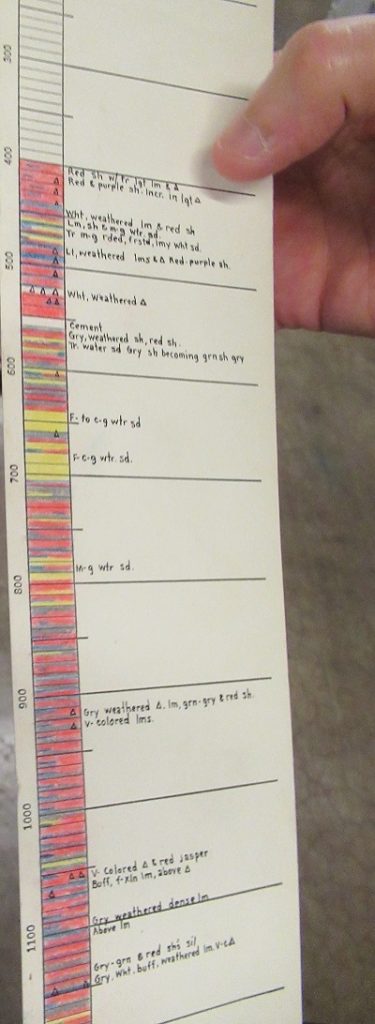
A hand-drawn strip log records various structure features and type of rocks, clays, shales, and formations.
The geological data library also includes reference materials, documents, journals, and maps. Some of the older maps are remarkably detailed — hand drawn and colored, often many years ago by independent geologists. There are storage areas for boxes of documents and artifacts donated to the library. Each must be carefully sorted through by a staff member or volunteer.
Many of the boxes of donated materials come from the families of petroleum geologists who have passed away. The contents can vary, but there often are records that should be preserved. “These are just a portion of the significant volume of donated historical well data that has been given to the library,” reported Harris. “Our members volunteer their time to go through the materials to determine what should be added to our collection.”
Opening the boxes themselves can become a discovery process, hand-drawn strip log record added, noting, “we often find unique and one-of-a-kind documents.”
Prior to the move to Edmond, material was housed in the former home of the Oklahoma Cotton Growers Association, the building was built in 1923 with two floors and a full basement. Large, slanted glass windows in the roof (uncovered during renovation) once helped illuminate bales of cotton for consistent evaluation and pricing.
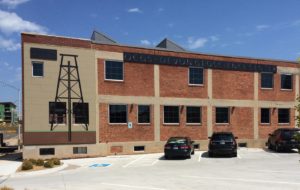
Moving from the former MCGL building in Oklahoma City, above, helped fund digitizing files.
The OCGS is an affiliate member of the Mid-Continent Section of the American Association of Petroleum Geologists (AAPG). Devon Energy, with its 50-story, $750 million headquarters located nearby, contributed $1 million to the original OCGS Capital Campaign and secured naming rights for the library’s renovated building, the OCGS Devon Geoscience Center.
_________________________
The American Oil & Gas Historical Society preserves U.S. petroleum history. Become an AOGHS annual supporting member and help maintain this energy education website and expand historical research. For more information, contact bawells@aoghs.org. Copyright © 2023 Bruce A. Wells. All rights reserved.
Citation Information — Article Title: “Library of Mid-Continent Well Data.” Authors: B.A> Wells and K.L. Wells. Website Name: American Oil & Gas Historical Society. URL: https://aoghs.org/energy-education-resources/mid-continent-geological-library. Last Updated: October 6, 2020. Original Published Date: October 30, 2017.


